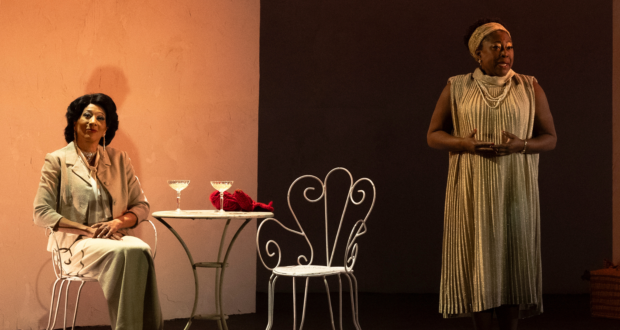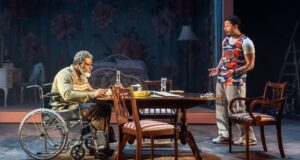A stylish double bill of modern and contemporary opera.Summary
Rating
Excellent
Philip Hagemann is an American composer of opera and choral music. At 92, his work spans over 80 pieces written over more than 50 years. He is most known for his operatic settings of George Bernard Shaw’s plays and American literary classics. Now, nearly all of his operas have now seen their UK debuts in partnership with Pegasus Opera, the predominantly black and asian opera company. This year, they present Hagemann’s Roman Fever alongside Francis Poulenc’s La Voix Humaine (billed as ‘The Human Voice’).
Roman Fever is based on American writer Edith Wharton’s 1934 short story of two Manhattan widows holidaying in Rome. Over the course of the story, jealousy and misery bubble up and one widow admits to the other that her daughter’s father is the other widow’s late husband. The popular story was set to music by Hagemann in 1989 and it holds up well today in Josette Bushell-Mingo’s staging.
Of Hagemann’s work, this is the best characterised. The music is made superb with camp exaggeration by our widows, performed by Bernadine Pritchett and Alison Buchanan (Pegasus Opera’s Artistic Director). He has written many witty and sharp musical phrases for the women, and these are pounced upon with a bitchy coolness by the singers. Despite the challenge of this unfamiliar work, the sound from the pit is pithy, without losing any expression; kudos to conductor Rebecca Tong.
The second work in this double bill is Poulenc’s 1958 one act opera for soprano and orchestra. Nadine Benjamin sings Elle, a woman on the phone to her former lover late at night, seeking his approval with increasing desperation. It’s a difficult and fiddly work for singers and orchestra, as it is designed to make operatic singing sound like a natural conversation. The random pauses and tiny, incremental rises and falls in the music are managed well in this production. Benjamin’s vocal precision is stunning; she is a heartbreaking Elle.
Both shows are incredibly chic. Powder-white flats and a large orb are, to begin, a baking, roman travertine backdrop with the sun scorching the backs of the widows and then a cool cell with a low moon voyeuristically peeping in on Elle in her nightdress. It’s all very stylishly designed by Peiyao Wang and lit by Nell Golledge (showing excellent skill despite not yet having graduated from RCSSD). With two good works and exceptional artistry, these two shows are the best of Pegasus Opera and Hagemann-Rosenthal’s collaborations to date.
Conducted by: Rebecca Tong
Directed by: Josette Bushell-Mingo OBE
Set and Costume Design by: Peiyao Wang
Lighting Design by: Nell Golledge
Produced by: Pegasus Opera and Hagemann-Rosenthal Productions
Roman Fever and The Human Voice have completed their current run. You can find out about future productions from Pegasus Opera here.
 Everything Theatre Reviews, interviews and news for theatre lovers, London and beyond
Everything Theatre Reviews, interviews and news for theatre lovers, London and beyond




One comment
Pingback: Roman Fever and The Human Voice review by everything theatre – Pegasus Opera | London Opera Company